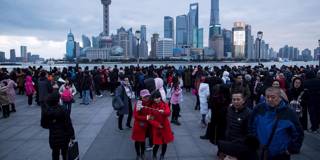China’s experience lifting hundreds of millions of people out of poverty in just a few decades holds important lessons. First and foremost, while randomized controlled trials and the types of targeted programs they assess may have a role to play in fighting inequality, the most powerful poverty-reduction tool is economic growth.
ANN ARBOR – This year’s Nobel Memorial Prize in Economic Sciences was awarded to Abhijit Banerjee, Esther Duflo, and Michael Kremer for their experimental approach to poverty reduction. In the Nobel Committee’s view, the economists’ use of randomized controlled trials (RCTs), a method adapted from medical sciences, to test whether specific interventions work has “considerably improved our ability to fight global poverty.”

ANN ARBOR – This year’s Nobel Memorial Prize in Economic Sciences was awarded to Abhijit Banerjee, Esther Duflo, and Michael Kremer for their experimental approach to poverty reduction. In the Nobel Committee’s view, the economists’ use of randomized controlled trials (RCTs), a method adapted from medical sciences, to test whether specific interventions work has “considerably improved our ability to fight global poverty.”